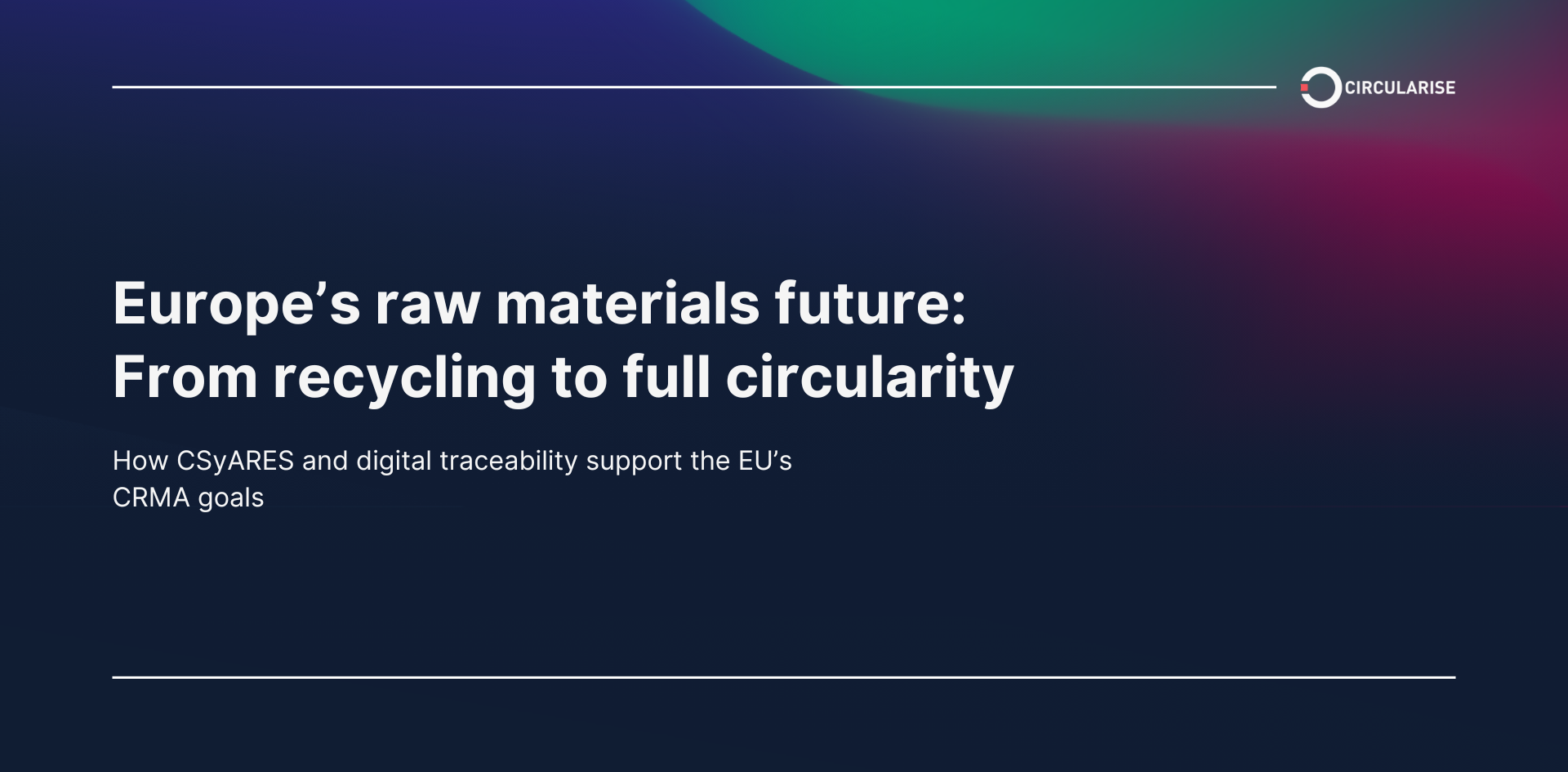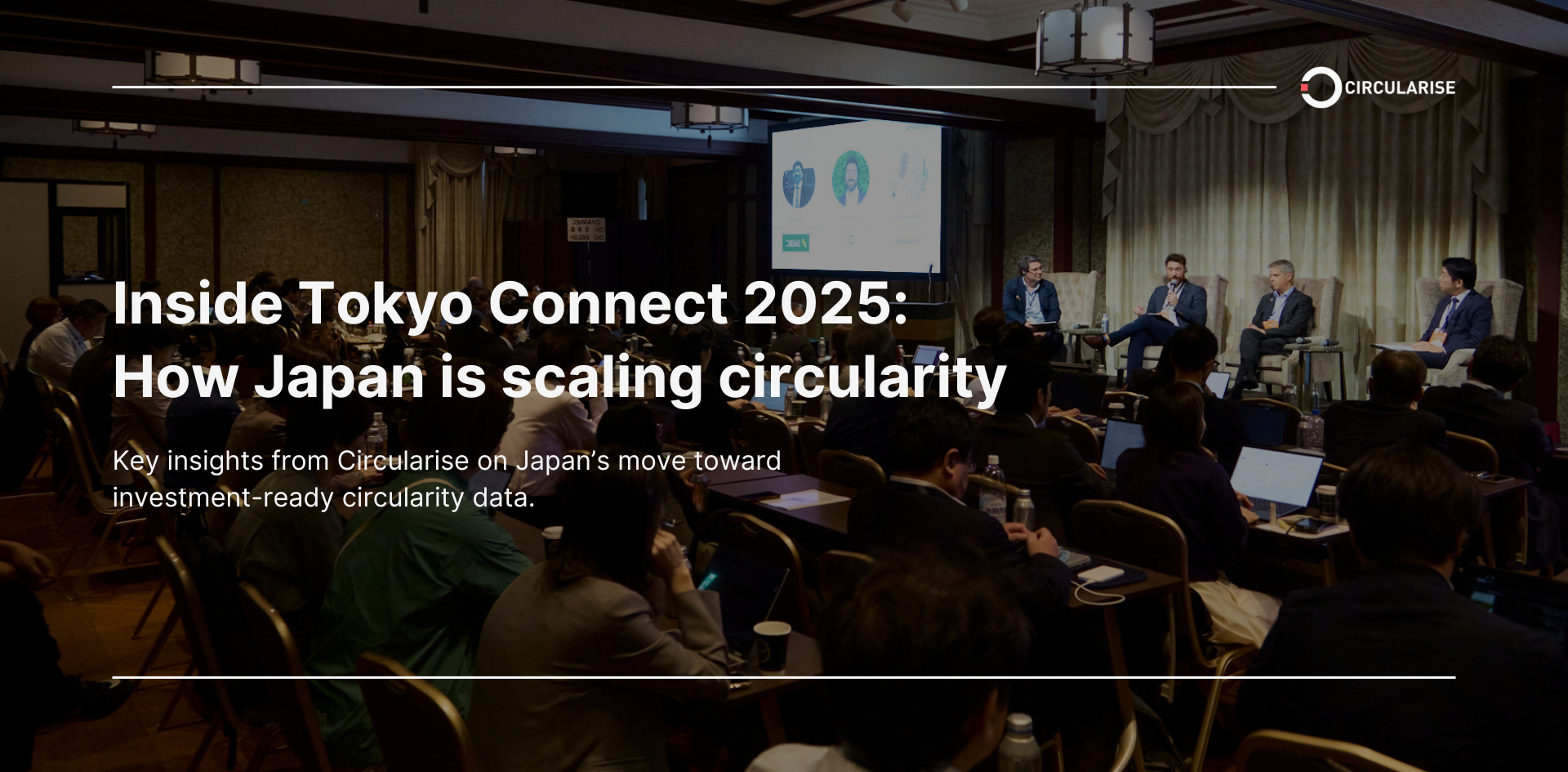As new regulations, growing public demand, and technological advances are making traceability in supply chains an essential requisite, companies now face the challenge of protecting data privacy whilst maintaining the transparency required to prove their sustainability claims. This is particularly salient for decentralised blockchain supply chain traceability solutions that provide more credibility for circular, sustainable supply chains.
Circularise has developed our patented “Smart Questioning” solution, which provides a secure way of making verifiable claims on the blockchain in a secure, confidential and scalable way. Fundamentally, it enables you to selectively share data with the highest level of privacy and confidentiality. This article explains how Smart Questioning works, its benefits and potential applications for your business.
Smart Questioning and its benefits
Having a suitable chain of custody model in place to trace materials through your supply chain is the first step, but how can you make relevant information available without risking sensitive information? For most companies, having full transparency could mean losing their competitive advantage and therefore, not a preferred solution.
With Smart Questioning, it is possible to provide proof while protecting privacy and confidentiality of data on public blockchains. Using cutting-edge zero-knowledge proof (ZKP) cryptography techniques, provable claims rather than raw data can be shared with external counterparts, retaining confidentiality over sensitive supply chain information.
Simply put, companies can easily decide what they want to share, and with whom. If you are a supplier to major OEMs and brands, Smart Questioning will enable the following for you:
- Become transparent while protecting data privacy and confidentiality
- Provide flexible and selective access to data to different stakeholders
- High level of credibility
- Retain competitive advantage
In order to have a better understanding of how Smart Questioning works, it is important to understand a little more about the jargon and the technology behind it. If you find it hard to understand the terminology, please refer to this glossary of blockchain terms.
Why use blockchain?
While blockchain has been touted to be one of the main enablers of the circular economy, it is neither hype nor panacea. With huge companies like Amazon, IBM, SAP, and Microsoft developing their own competitive blockchain services, it shows that the technology is dependable and has immense potential. At Circularise, we have conducted extensive research and expert panels on this topic.
Blockchain is a distributed digital database that validates and stores information as an immutable “block” on a public record or ledger. A public blockchain is one that is decentralised and serves as a single source of truth distributed across a network of systems. Data recorded on the blockchain is persistent, making it a highly secure and transparent system as it would be too difficult to alter or manipulate the data. At the heart of blockchain is cryptography, a secure way of transmitting and storing data.

Once chain-of-custody transactions have been recorded on the blockchain, they cannot be tampered with, building trust in the vast ecosystem of value chain partners. With the standardisation of protocols, more collaboration and transparency can be brought to sustainable manufacturing.
Circularise’s system is built on Ethereum, which recently reduced its energy usage by 99%. Generating and verifying proofs require complex computation, increasing the costs of fees associated with Ethereum. However, additional efforts have been made in reducing the cost per transaction by scaling the number of transactions processed in a block.
While public blockchains like Ethereum provide the highest level of decentralisation, keeping information private and confidential on a public blockchain is hard. It requires new ways of keeping data perfectly secure from breaches. We developed our Smart Questioning solution which implements zero-knowledge proofs that allow only the intended recipients to process and decipher the data, which begs the question, what are zero-knowledge proofs and how do they work?
What are zero-knowledge proofs?
A zero-knowledge proof (ZKP) is a method by which the prover can prove to the verifier that a specific statement is true, without sharing any information apart from the fact that the statement is indeed true.
Our solution uses Pedersen commitments, which are cryptographic algorithms that are very similar in function to hashes. It allows the prover to prove a committed value or certain properties thereof, but without revealing or being able to change it.
Think of this as a fingerprint of data stored on the blockchain. When relevant data about your product is collected, a unique fingerprint of that data is generated without revealing any details about it. This fingerprint is what allows you to make verifiable statements about your product, and for other supply chain stakeholders to receive answers to certain questions.

You can read more about how zero-knowledge proofs work in this article.
How Smart Questioning Works
When you create a batch, you put data about a sustainability claim in a unique fingerprint. What this means is that anybody can see it, but the actual data is kept confidential and cannot be tampered with. The commitment is a random value computed using the data of the sustainability claim.
When someone asks for proof of the sustainability claim, a zero-knowledge proof is made using the data. The person asking the question is able to verify if this proof is about your sustainability claim with just the public fingerprint to the sustainability claim. If the proof is valid, they can be convinced of your claim based on the mathematical guarantees of the zero-knowledge proof scheme.
Question Lists
When attaching data to a batch, it is split into three levels: site data, product data, and batch data. Data points from all these levels can be included in Question Lists. Question Lists are categories of questions pertaining to certifications, regulations, industry demand, and supplier requirements.
Smart Questions
Smart Questioning is Circularise’s proprietary technology designed to allow a verifier (e.g. brand owner) to ask a series of carefully curated questions from a prover (e.g. supplier) in order to obtain relevant information about a product without disclosing any sensitive data.
You can control which questions can be asked by giving permission to access question lists. Question lists need to be selected when creating a template or a batch. Based on the selection of question lists, certain data points will be made visible.
When the commitment is filled with data about a batch, question lists can be supported. In this list the question can have different levels of disclosure:
- Full Disclosure: Full disclosure of the data to approved organisations, e.g. manufacturer name
- Public: Data is stored on the blockchain, e.g. weight and asset type.
- Range Proof: Only disclose a particular insight without disclosing the underlying data, e.g. concentration of mercury is not exceeding 0.001%
- No Disclosure: No disclosure of the data, e.g. data part of the commitment that is not shared externally
- Set membership: Disclose that the data is (not) part of a predefined list, e.g. address is not part of conflict zones
With Smart Questioning you can choose exactly what data you want to share, and the level of disclosure for the answers. Details on your chain of custody, certifications, processes, batches, LCA data, chemical compositions and sourcing can be included. You will be able to view relevant information on the full chain and on specific batches, as well as visual representations of the data for your convenience.
The following represents a very simple interaction between only two participants, Supplier A and OEM B who are already set up on Circularise.
Smart Questioning process
- Supplier A sets up questions in Question Lists and answers with selected levels of disclosure
- Supplier A attaches documentation to showcase its compliance with GHG Protocol, TfS CRS, ISO or other standards to a batch.
- This generates the commitment, which is stored on the blockchain
- Supplier A gives OEM B access to the relevant question list
- OEM B can see the list of supported questions in the question list
- OEM B chooses a question from the question list
- Supplier A provides the answer at the agreed disclosure level supporting it with the proof
- Smart Questioning retrieves the commitment and verifies the proof
In this way, OEM B can trust that claims by Supplier A are true and supported by evidence, while Supplier A does not have to give up any confidential data.

How does Smart Questioning work in real life?
Here are some examples of Smart Questions, disclosure type, and answers in various industries.
- Battery industry
- Smart Question [Range Proof] : Is concentration of mercury extending 0.001%?
- Answer: No, concentration of mercury less than 0.001%
- Electronics Industry
- Smart Question [Range Proof]: Does the product contain Lead (Pb)?
- Answer: No Lead (Pb) content in Product
- Electronics Industry
- Smart Question [Set Membership]: Is tungsten sourced from the DRC region?
- Answer: No
- Plastics Industry
- Smart Question [Set Membership]: Does the product contain Bromine?
- Answer: No
- Plastics Industry
- Smart Question [Range Proof]: Is the primary fossil material content less than 25%?
- Answer: Yes, primary fossil material content less than 25%
- Any Industry
- Smart Question [Range Proof]: Is the product carbon footprint per kg over 3 kg CO2-eq?
- Answer: Yes
What benefits does Smart Questioning bring?
While this is most useful between businesses, such as sharing the Life Cycle Assessment (LCA), or insights to Scope 3 emissions of a product between supplier and manufacturers, brands can also use Smart Questioning to engage with your consumers.
A customer could scan a QR code to verify the sustainability claim of your product and find out more based on their personal values. For example, they could ask about the environmental impact of the product, or if it came from a place without child labour. You read more about how Circularise helped Porsche achieve visibility in their supply chain.

To summarise, Smart Questioning
- Stores and manages the user’s data in a secure way
- Generates the fingerprints that are stored on the blockchain
- Manages your confidential data and transactions
- Asks questions, stores answers, and verifies them
- Answers questions by providing proofs
The cutting-edge technology behind Smart Questioning facilitates flexible transparency without compromising confidentiality all along the supply chain. It can build trust between partners and consumers, incentivise sustainable sourcing and production, as well as reduce time and costs around verifying transactions.
With new legislations targeted at supply chain due diligence, such as the German Supply Chain Act, Battery Passport Regulations, Corporate Sustainability Reporting Directive (CSRD), and Digital Product Passports, more industries and companies are turning to blockchain technology for its applications in supply chain management.
The solutions we offer at Circularise are flexible and fully customisable for your company’s needs. Are you interested in learning more about how Circularise can help your company prove sustainability claims without risking sensitive information?

Circularise is the leading software platform that provides end-to-end traceability for complex industrial supply chains. We offer two traceability solutions: MassBalancer to automate mass balance bookkeeping and Digital Product Passports for end-to-end batch traceability.



.png)



